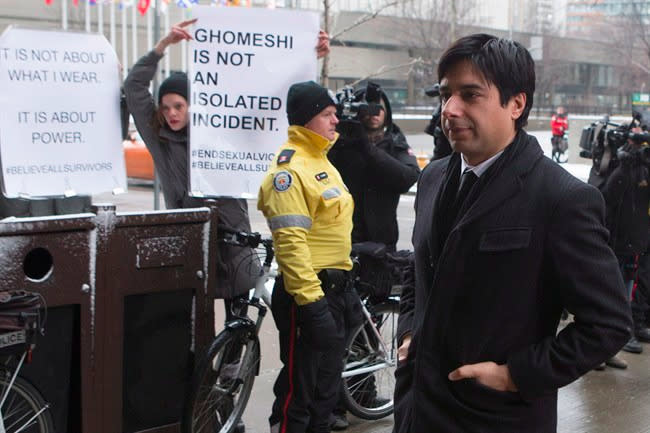 Daily Brew
Daily BrewGhomeshi trial puts spotlight on sex assault and justice system

[Ex-CBC radio host Jian Ghomeshi walks past protesters as he arrives at a Toronto court for Day 6 of his trial on Tuesday, Feb. 9, 2016. THE CANADIAN PRESS/Chris Young]
The sexual assault trial of fallen radio star Jian Ghomeshi was always going to be controversial.
There was the 48-year-old’s pre-emptive strike on social media, defending his “private sex life,” and his $50-million lawsuit against the CBC, which dismissed the host over allegations of sexual violence dating back, some of them, well over a decade.
Five days into Ghomeshi’s trial, Globe and Mail columnist Margaret Wente called it a fiasco; National Post writer Christy Blatchford declared it a case “built upon the self-serving and carefully edited allegations of dishonest complainants.”
The tone of coverage by dozens of media outlets flocking to the Toronto courthouse every day changed as Ghomeshi’s defence lawyer, Marie Henein, picked apart the testimony of the three women who allege the former CBC radio host punched, choked or otherwise assaulted them without their consent.
The case once fêted as a victory for women who come forward with allegations of sexual assault is now fretted as a prime example of why women don’t.
But the case is far from typical, says Blair Crew, a professor of criminal law at the University of Ottawa.
“Any skilled defence lawyer is going to be able to find inconsistencies which are going to be argued to be the hallmark that the statement is not reliable or credible,” Crew tells Yahoo Canada News.
“One of the things that is different about it is that Marie Heinen has a lot more material to work with than you would normally get,” he adds, referring to the dozens of media interviews the complainants have done since the allegations surfaced.
It’s normal practice for defence lawyers to seize on inconsistencies. And it is normal, in traumatic events, for the mind to focus on different details in each iteration, he says.
“It’s also entirely secondary to the issue of whether or not the assaults at the time occurred,” Crew says.
Ghomeshi is on trial for four counts of sexual assault and one count of overcoming resistance by choking, stemming from allegations dating to 2002 and 2003.
He faces a separate trial in June on an allegation of sexual assault dating to 2008.
But the judge, who is hearing the case without a jury, also has the option of the lesser and included charge of simple assault.
Though the number of interactions the complainants had with Ghomeshi after the alleged incidents occurred and the failure to disclose those details are “really quite exceptional,” they are not necessarily unusual, he says.
“It’s not as straight forward as it seems in terms of what you’re going to do after you’ve been assaulted in this way.”
Statistics show that 90 per cent of sexual assaults are committed to people known to the victim, he says. Only about one in 10 sexual assaults is reported and charges are laid in just 15-20 per cent of cases — much lower than any other crime, he says.
But a complainant in any crime is better off to reveal the details “warts and all,” rather than being selective about events, Crew says.
While the cross-examination of the complainants has been rigorous, it’s important to note it has not crossed the line to victim-blaming, he says.
“Some of what’s happening in the trial is the kind of examination you would expect in any trial. Marie Heinen seems to be getting into their reliability and their credibility and their motive,” Crew says.
“But it hasn’t been a trial about what other kinky sex practices have the women engaged in in the past and it hasn’t been a trial about we’re going to subpoena your employment records and your therapeutic counselling records …
“Not ‘what were you wearing, what were you doing before, what did you have to drink on the night of.’ Not ‘who else have you said yes to in the past?’ None of that stuff has really been featured in this trial.”
It appears Ghomeshi will not take the stand. The case is expected to begin closing arguments later this week.
Peter Rosenthal, a lawyer and math professor at the University of Toronto, cautions any armchair judges against deciding the outcome.
“The defence has benefitted very much from the statements that the complainants have made to the media,” Rosenthal says.
“But the bottom line for the judge is does he believe beyond a reasonable doubt that the offences were committed, despite any inconsistencies.”


